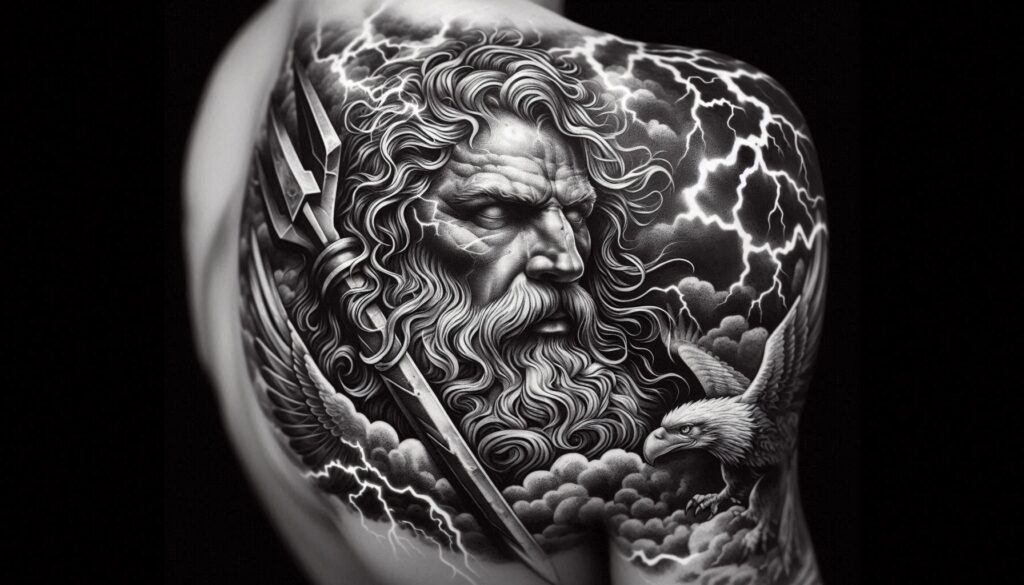Spiritual Meanings
What Does a Zeus Tattoo Symbolize?

What Does a Zeus Tattoo Symbolize?
Zeus tattoos hold deep significance for many people, permeating ancient mythologies and modern interpretations alike. They can symbolize power, authority, and protection, while also connecting the wearer to Greek culture. This article delves into the various meanings behind Zeus tattoos, helping you understand if this ink is right for you.
The Spiritual Meaning
In the realm of spirituality, Zeus symbolizes an array of powerful attributes. As the king of the gods in Greek mythology, he embodies strength, wisdom, and leadership. A tattoo of Zeus is often seen as a representation of power over one’s life and circumstances. It serves as a reminder to the wearer of their inner strength and ability to rise above challenges.
Additionally, Zeus is often associated with the sky and thunder, elements that can represent freedom and elevation. People who choose to ink a Zeus portrait often appreciate these elements and seek to embrace a higher level of existence. The imagery related to Zeus can also signify protection, as many believe that he watches over his followers, infusing them with courage and resolve.
The Biblical Meaning
While Zeus originates from Greek mythology, some might draw parallels between his characteristics and biblical figures. For instance, the attributes of authority and the power of creation in Zeus can be compared to those of the God depicted in the Bible. This comparison, however, is more philosophical than doctrinal; thus, interpretations can vary widely.
If someone were to wear a Zeus tattoo with a biblical perspective, they may view it as a symbol of divine authority. It might evoke the same awe and respect people hold for God. However, it’s essential to approach such connections with sensitivity, as interpretations may lead to differing opinions among various religious communities. Ultimately, a Zeus tattoo is a personal choice that can reflect both admiration for mythology and a search for deeper spiritual meanings.
Who Should Not Get This Type of Tattoo

Not everyone is suited for a Zeus tattoo. Individuals closely aligned with Christianity, Islam, or other religions that may view Greek mythology as heretical may want to reconsider getting this ink. Having a tattoo of a Greek god could be perceived as contradictory to their beliefs and may evoke criticism or concern from their faith communities.
Furthermore, people who do not connect with the themes or symbolism surrounding Zeus should think twice before committing. A tattoo is a lifelong mark; thus, it should reflect personal values and beliefs. If you’re unsure about the meaning or significance of a Zeus tattoo, it might be best to wait until you fully understand what it symbolizes for you. Tattoos can represent significant aspects of who you are, and it’s crucial that you feel aligned with that representation.
Other Religious Interpretations
Beyond Christianity and Islam, different religions have unique interpretations related to Zeus. In certain Hindu interpretations, the concept of supreme deities parallels Greek gods, where Zeus can represent a higher divine authority. Some may see it as a bridge connecting various belief systems, viewing Zeus as an archetype of strength, wisdom, or power that exists in multiple religious narratives.
Moreover, in New Age beliefs, Zeus may symbolize the divine masculine energy, representing characteristics like assertiveness, protection, and leadership. In this context, a Zeus tattoo may interpret a connection to source energy, indicating empowerment and personal growth.
This multifaceted symbolism indicates that a Zeus tattoo can speak to various people in different ways, bridging gaps between cultures and belief systems. However, awareness of each interpretation is essential to avoid cultural appropriation and misuse of symbols.
Cover-Up Ideas If Things Went Wrong

Though tattoos are meant to last forever, sometimes the choices we make can lead to regret. If you find yourself dissatisfied with your Zeus tattoo, there are ways to cover it effectively. One option is changing the design to something more meaningful. For example, you could transform a full Zeus portrait into a more abstract piece that represents strength or power without directly depicting the god.
Another popular method is incorporating other elements into the existing tattoo, such as incorporating mythological symbols like thunderbolts or eagles—both are associated with Zeus. These additions can alter the original tattoo into a new design that feels more personal and significant.
Additionally, working with a skilled tattoo artist can give you various options for custom designs, allowing for creativity in covering the old ink. If you find your tattoo no longer represents your journey, don’t be disheartened—many have successfully turned a regrettable tattoo into something they admire.
Choosing the Right Location for Your Tattoo
When deciding on a Zeus tattoo, location can enhance its symbolism. The forearm, chest, and back are popular placements, allowing for larger, more intricate designs. Each area holds different meanings; for example, a tattoo on the forearm can symbolize strength and readiness to face life’s battles. The chest, often tied to the heart, can signify deeper emotions tied to power and protection.
Moreover, consider visibility when selecting a location. Some people prefer tattoos that can be hidden to maintain a professional demeanor, while others may want their tattoos visible as a form of self-expression. Reflecting on how this tattoo will fit into your lifestyle is just as essential as the design itself.
The Artistic Interpretation
Tattoos are an art form, allowing unique expressions of oneself. Artists interpret Zeus in various styles, from traditional portraiture to neo-traditional designs or even abstract renditions. Each artist brings a unique viewpoint, making it essential to choose one who resonates with your interpretation of Zeus.
Colors, styles, and complexity can drastically alter the meaning of a Zeus tattoo. For instance, a vibrant color scheme may convey a more dynamic sense of power, while a monochrome design could evoke a sense of classic strength and tradition. Types of depiction can range from a realistic portrait to symbols like thunderbolts forming a minimalist design.
By carefully choosing your tattoo style and artist, you can ensure that your representation of Zeus aligns with your personal philosophy. Tattoos can serve as powerful reminders, enhancing your connection with the symbol you carry.

Also read : The Power of Spiritual Elevation: Understanding the Meaning of a Spiritual High
Conclusion
In conclusion, a Zeus tattoo can symbolize various meanings, from power and authority to protection and spirituality. As with any tattoo, it’s essential to carefully consider its significance in your life. Whether you relate deeply to Greek mythology or find power in the archetypal imagery of Zeus, tattoos are a form of self-expression that can hold profound meaning.
Understanding the spiritual interpretations, religious implications, who might not want certain designs, and considering cover-up options are essential steps in the decision-making process. Tattoos are lifelong commitments, and it’s essential that your design truly reflects who you are and what you believe. Ultimately, the journey of getting a tattoo should resonate with your life, values, and aspirations.
FAQs
What are some common symbols associated with Zeus?
Common symbols linked to Zeus include the thunderbolt, eagle, and oak tree. These elements are often incorporated into Zeus tattoos to enhance their meaning further.
Can I incorporate other mythological figures with a Zeus tattoo?
Absolutely! Many people choose to combine Zeus with other mythological figures or symbols to create a unique, personalized narrative that speaks to their experiences or beliefs.
How do I find the right tattoo artist for a Zeus tattoo?
Research different tattoo artists by reviewing their portfolios, focusing on their style and previous work. Chat with them to ensure their interpretation of Zeus aligns with your vision before making a decision.
Is there an age restriction for getting a Zeus tattoo?
Age restrictions often vary by location. In most places, individuals need to be at least 18 to get a tattoo without parental consent. Always check local laws if you’re unsure.
Can a Zeus tattoo represent something other than power?
Yes, a Zeus tattoo can symbolize various themes, such as wisdom, protection, or even personal growth, depending on the individual’s connection to the imagery and its meanings.
Spiritual Meanings
What is the spiritual significance of the common starling?

The spiritual significance of the common starling?
we will explore the spiritual significance of the common starling, a bird known for its striking appearance and behavior. We will delve into the symbolism and meanings associated with the common starling in various spiritual traditions and how it can serve as a powerful guide and messenger in our spiritual journey.
What is the spiritual significance of the common starling?
The common starling, also known as the European starling, holds deep spiritual significance in various cultures and belief systems. In many spiritual traditions, birds are considered to be messengers from the divine, bridging the gap between the earthly realm and the spiritual realm. The common starling, with its glossy black plumage and iridescent sheen, is often seen as a symbol of magic, mystery, and spiritual connection.

In Celtic mythology, the starling is associated with transformation and shape-shifting, symbolizing the ability to adapt to changing circumstances and embrace new beginnings. The starling’s murmurations, where thousands of birds move together in synchronized harmony, are seen as a powerful metaphor for unity, cooperation, and collective consciousness.
How can the common starling guide us on our spiritual journey?
For those who resonate with the spiritual significance of the common starling, the bird can serve as a guiding light on their spiritual path. The starling’s adaptability and resilience can inspire us to embrace change and transformation in our own lives, trusting in the divine guidance that is always present.
When we observe the starling’s murmurations, we are reminded of the power of unity and collective consciousness. We are encouraged to connect with others in a spirit of cooperation and harmony, recognizing that we are all interconnected and part of a larger whole. The starling can also remind us to trust in our intuition and inner wisdom, following the path that resonates with our true purpose and passion.
What are the symbolic meanings of the common starling in different spiritual traditions?
In Native American spirituality, the common starling is often seen as a symbol of communication and connection with the spirit world. The bird’s melodious songs and vocal mimicry are believed to carry messages from the ancestors and spirit guides, guiding and protecting the tribe.

In Chinese culture, the common starling is associated with good luck and prosperity. The bird’s ability to mimic sounds is seen as a sign of intelligence and adaptability, qualities that are highly valued in Chinese philosophy and folklore.
In Hinduism, the common starling is considered to be a sacred messenger from the gods, carrying blessings and divine guidance to those who are open to receiving them. The bird’s graceful flight and melodious songs are seen as manifestations of the divine presence in the natural world.
How can we connect with the spiritual energy of the common starling?
To connect with the spiritual energy of the common starling, we can spend time in nature, observing the bird in its natural habitat and listening to its songs. We can also meditate on the symbolism and meanings associated with the common starling, reflecting on how it resonates with our own spiritual journey.
Creating artwork or crafts inspired by the common starling can also help us connect with its energy and wisdom. By incorporating the bird’s symbolism into our daily lives, we can invite its guidance and protection into our hearts and homes, fostering a deeper connection with the spiritual realm.
What does it mean if a common starling crosses your path?
Seeing a common starling cross your path can be a powerful omen or message from the universe. In many spiritual traditions, birds are seen as messengers from the divine, bringing guidance and blessings to those who are open to receiving them. If a common starling crosses your path, it may be a sign that you are being called to embrace change and transformation in your life, trusting in the divine guidance that is always present.

Pay attention to any thoughts or feelings that arise when you encounter a common starling, as they may hold valuable insights and messages for you on your spiritual journey. Take the time to connect with the bird’s energy and symbolism, allowing it to guide you towards greater clarity, purpose, and spiritual growth.
Also read : The Spiritual Significance of October in the Bible
Conclusion
In conclusion, the common starling carries deep spiritual significance in various cultures and belief systems, symbolizing transformation, unity, and divine guidance. By connecting with the energy and symbolism of the common starling, we can tap into its wisdom and power, guiding us on our spiritual journey towards greater self-awareness and connection with the divine.
FAQs
1. Can the common starling bring good luck?
Yes, in Chinese culture, the common starling is associated with good luck and prosperity due to its intelligence and adaptability.
2. How can I connect with the spiritual energy of the common starling?
To connect with the spiritual energy of the common starling, spend time in nature observing the bird, meditate on its symbolism, and create artwork inspired by the bird.
3. What does it mean if a common starling crosses my path?
Seeing a common starling cross your path may be a sign of change and transformation in your life, urging you to trust in divine guidance.
4. How can the common starling guide me on my spiritual journey?
The common starling can guide you by inspiring adaptability, unity, and connection with the divine, encouraging you to embrace change and trust your intuition.
5. Are there any specific rituals or practices associated with the common starling in spirituality?
While there are no specific rituals or practices associated with the common starling, you can incorporate the bird’s symbolism into your daily life through meditation, observation, and creative expression to connect with its spiritual energy.
Spiritual Meanings
The Spiritual Significance of October in the Bible

The Spiritual Significance of October in the Bible
This article explores the spiritual significance of October in the Bible, highlighting the symbolism and meaning behind this autumn month.
What does the month of October symbolize in the Bible?
In the Bible, the month of October carries with it themes of harvest, abundance, and preparation. As the autumn season sets in, October represents a time of reaping the rewards of hard work and sowing seeds for the future. It is a time to reflect on God’s abundance and blessings in our lives, as well as a time to prepare for the colder months ahead. The changing colors of the leaves and the crisp fall air remind us of the beauty of God’s creation and the cycle of life.

Throughout the Bible, the number eight is often associated with new beginnings and regeneration. October is the tenth month of the year, which adds up to the number one, symbolizing unity and God’s sovereignty. This month serves as a reminder that God is in control of all things and that we can trust in His timing and provision.
How can we embrace the spiritual significance of October in our lives?
One way to embrace the spiritual significance of October is to take time to reflect on the blessings in our lives and give thanks to God for His provision. This can be done through prayer, meditation, and acts of service to others. October is also a time to prepare our hearts and minds for the season ahead, seeking God’s guidance and wisdom as we navigate the challenges and opportunities that come our way.
Embracing the symbolism of harvest and abundance can inspire us to be generous and share our blessings with others. Whether it’s through giving to those in need, volunteering in our communities, or simply expressing gratitude to those around us, we can embody the spirit of October and spread God’s love to those in our midst.
What are some key Biblical references to October?
While the specific month of October may not be mentioned in the Bible, there are several passages that speak to the themes of harvest, abundance, and preparation that are associated with this time of year. In Genesis 8:22, God promises the cycle of seedtime and harvest will continue as long as the earth endures, reminding us of the importance of sowing seeds of faith and reaping the rewards of God’s blessings.
Proverbs 3:9-10 encourages us to honor the Lord with our wealth and the firstfruits of all our crops, trusting in His provision and abundance. This passage speaks to the significance of giving back to God and others as a way of acknowledging His sovereignty and grace in our lives.
How can we incorporate the spiritual lessons of October into our daily lives?
One way to incorporate the spiritual lessons of October into our daily lives is to create a gratitude practice, where we take time each day to give thanks for the blessings in our lives. This can be done through journaling, prayer, or simply reflecting on the good things that have come our way.

Another way to incorporate these lessons is to engage in acts of kindness and generosity towards others, whether through volunteering, donating to charity, or simply showing compassion to those in need. By embodying the spirit of harvest and abundance, we can spread God’s love and light to those around us, creating a ripple effect of positivity and goodwill.
What are some common traditions associated with October in the Bible?
While October itself may not have specific traditions mentioned in the Bible, many cultures and faith traditions celebrate harvest festivals and feasts of thanksgiving during this time of year. These traditions often involve giving thanks for the bounty of the land, sharing meals with loved ones, and expressing gratitude for God’s provision.
Some common traditions associated with October in the Bible include the Feast of Tabernacles, also known as Sukkot, which commemorates the Israelites’ time in the wilderness and God’s protection and provision. This festival includes building temporary shelters, gathering together for meals, and offering sacrifice and praise to God.
Also read : What Does It Mean Spiritually to Have Two Different Colored Eyes?
Conclusion
October holds a special spiritual significance in the Bible, symbolizing harvest, abundance, and preparation for the future. By embracing the themes of this autumn month, we can deepen our connection to God, express gratitude for His blessings, and spread His love to those around us. May we take this opportunity to reflect on the beauty of God’s creation and the cycle of life, trusting in His provision and guidance as we journey through the season ahead.
FAQs
1. What is the significance of the number ten in the Bible?
The number ten is often associated with completeness and divine order in the Bible. It symbolizes unity, wholeness, and the sovereignty of God. In the Book of Exodus, the Ten Commandments were given to Moses as a guide for righteous living, highlighting the importance of obedience to God’s laws.
2. How can we express gratitude to God in our daily lives?
There are many ways to express gratitude to God in our daily lives, including prayer, meditation, acts of service, and giving thanks for the blessings in our lives. By taking time to acknowledge God’s provision and grace, we can cultivate a spirit of gratitude and humility that deepens our relationship with Him.
3. What lessons can we learn from the changing seasons?
The changing seasons remind us of the cyclical nature of life and the importance of embracing new beginnings and endings. Just as the earth goes through cycles of growth, decay, and rebirth, we too can learn to adapt to change, seek out opportunities for growth, and trust in God’s timing and providence.
4. How can we prepare for the future during the month of October?
One way to prepare for the future during October is to take stock of our lives and set goals for the coming months. This can be done through prayer, reflection, and seeking God’s guidance on the path ahead. By taking proactive steps to plan for the future, we can align ourselves with God’s will and purpose for our lives.
5. How can we spread God’s love to others during the month of October?
One way to spread God’s love to others during October is through acts of kindness and generosity. Whether it’s volunteering, donating to charity, or simply sharing a kind word or gesture, we can be the hands and feet of Jesus in our communities. By embodying the spirit of harvest and abundance, we can shine God’s light to those in need and bring hope and healing to a hurting world.
Spiritual Meanings
What Does It Mean Spiritually to Have Two Different Colored Eyes?

What Does It Mean Spiritually to Have Two Different Colored Eyes?
Having two different colored eyes, a condition known as heterochromia, has fascinated people for centuries. Beyond the physical differences, many cultures and spiritual beliefs attribute deep symbolic meanings to this unique trait. This article explores the spiritual implications of having two different colored eyes, the symbolism involved, and the perspectives held by various cultures.
Understanding Heterochromia
Heterochromia is a condition that results in a person having two different colored irises. It can occur in a variety of forms: complete heterochromia, where each eye is a completely different color; sectoral heterochromia, where part of one iris is a different color from the rest; and central heterochromia, characterized by different colors around the pupil. While often perceived as strikingly beautiful, the condition invites speculation regarding its deeper meanings.
Physical vs. Spiritual Perspectives
From a medical perspective, heterochromia can stem from genetics, injury, or certain medical conditions. However, when viewed through a spiritual lens, the trait takes on a different significance. Many believe that the eye, often referred to as the “window to the soul,” holds profound spiritual indicators. Thus, having two different colored eyes can be seen as a symbol of duality, offering insight into one’s inner self.
The physical manifestation of heterochromia has led some to consider it a mark of uniqueness. It’s not merely an aesthetic difference but a sign of an individual destined for a different path. Those with this trait are often said to possess heightened sensitivity, a richer emotional life, and a deeper connection to the metaphysical.
Symbolism of Different Colored Eyes
Having two different colored eyes symbolizes the coexistence of opposites. This duality could manifest as the balance of light and dark, joy and sorrow, or the melding of two spiritual paths. Some interpretations link heterochromia to the balance of masculine and feminine energies within oneself, suggesting that the individual may possess a unique ability to navigate these contrasting forces.
In many spiritual traditions, the eyes are seen as a reflection of one’s inner state. Different colored eyes may denote an individual who is particularly perceptive, with the capability to see beyond superficial appearances and recognize deeper truths. This keen awareness may also translate into intuitive abilities, making these individuals more attuned to the energies around them.
Moreover, those with heterochromia often inspire curiosity and wonder among others, leading them to perceive these individuals as having an enigmatic quality. This can manifest in interpersonal relationships, where the person may function as a bridge between differing ideas or beliefs, fostering understanding and communication.

Cultural Perspectives on Heterochromia
Various cultures throughout history have attributed special meanings to heterochromia. For instance, in ancient Greek culture, having different colored eyes was once considered a mark of special favor from the gods. Those who possessed this trait were often revered as having unique insight or wisdom, as if blessed with a deeper understanding of the world around them.
Similarly, Native American cultures frequently view different colored eyes as an indication of a person’s spiritual gifts. They believe that such individuals can see beyond the physical realm, acting as a conduit between the natural world and the spiritual domain. Some tribes may even incorporate the concept of heterochromia into their mythologies, suggesting that individuals with this trait possess the ability to access other dimensions of existence.
In contrast, some modern spiritual movements interpret the condition as a sign of higher consciousness, suggesting that individuals with heterochromia are more likely to awaken spiritually and understand their purpose in life. They are often thought to have a better grasp of the interconnectedness of all life, and thus are seen as potential guides for others on their spiritual journeys.
Personal Growth and Transformation
Having two different colored eyes can also signify a journey of personal growth and transformation. Often, individuals with this unique feature may find themselves navigating dual realities—juggling between their spiritual and material lives or balancing conflicting emotions. Embracing these contradictions can lead to profound self-discovery and empowerment.
This duality challenges individuals to embrace their differences, harnessing the unique energies each eye symbolizes. It encourages a sense of self-acceptance and authenticity, motivating one to step into their true power. For many, having two colored eyes becomes a catalyst for positive change, inspiring them to pursue their passions and challenge societal norms.
Additionally, people who experience this condition may often find that they attract attention and intrigue, which can serve as a reminder of their impactful presence in the world. This visibility can drive them to be more open-minded, thoughtful, and compassionate, as they learn to appreciate the diverse colors and shades of life beyond mere appearances.

Enhancing Intuitive Abilities
Many believe that individuals with heterochromia possess enhanced intuitive abilities. Their unique eye colors can symbolize their capacity to understand emotions and energies on a profound level. This heightened awareness often translates into strong empathic traits, enabling them to feel and sense what others are experiencing.
Embracing this gift can lead to a more fulfilled life where they can assist others in navigating their emotional landscapes. Those with heterochromia might be successful in careers that involve caregiving, counseling, or other healing professions, as they are often drawn to help others.
This spiritual perspective encourages individuals to honor and cultivate their intuition. They may find solace in practices such as meditation, energy healing, or mindfulness, further developing their innate gifts and enhancing their connection with the universe around them.
Also read : What is the spiritual significance of a bonsai tree?
Conclusion
Having two different colored eyes, or heterochromia, extends beyond physical distinction into the realm of spirituality and symbolism. This unique trait embodies the balance of duality, serves as a gateway to intuitive abilities, and reflects a rich tapestry of cultural significance. Those born with this condition often find themselves on a journey of self-discovery, empowerment, and personal growth.
Throughout history, different cultures have esteemed heterochromia as an indicator of wisdom, open-mindedness, and spiritual awakening. Embracing these attributes can lead one to appreciate their uniqueness, nurture their intuitive capacities, and embody their truth. Ultimately, individuals with two different colored eyes are frequently perceived as beacons of light, guiding both themselves and others on the path to spiritual understanding and fulfillment.
FAQs
1. Can heterochromia be developed later in life?
Yes, while many cases are congenital, heterochromia can develop later due to injury, illness, or certain medications.
2. Are there any famous people with heterochromia?
Yes, several well-known figures, including actors like David Bowie and Kate Bosworth, are known for their unique eye colors.
3. Is heterochromia associated with any specific personality traits?
While there are no definitive personality traits linked to heterochromia, many believe that individuals with different colored eyes are often more empathetic and intuitive.
4. How can individuals embrace their unique eye colors spiritually?
Embracing heterochromia spiritually can involve connecting with practices like meditation, journaling, or other forms of self-exploration to understand their inner dualities and enhance intuitive abilities.
5. Can someone have a spiritual awakening as a result of having heterochromia?
Many believe that individuals with this trait may have a deeper connection to the spiritual realm, potentially serving as a catalyst for spiritual awakening or heightened awareness.
-

 Spiritual Meanings1 year ago
Spiritual Meanings1 year agoWhat is the spiritual significance of a baby born with teeth?
-

 Dream Meanings1 year ago
Dream Meanings1 year agoWhat does it mean to dream about being in jail? Exploring the spiritual significance of imprisonment in dreams
-

 Spiritual Meanings1 year ago
Spiritual Meanings1 year agoThe Symbolism of a Tree Branch Falling: A Sign from the Universe
-

 Spiritual Meanings2 years ago
Spiritual Meanings2 years agoWhat is the spiritual meaning of heart palpitations?
-

 Spiritual Meanings2 years ago
Spiritual Meanings2 years agoWhy do I keep seeing red cars everywhere? Exploring the spiritual symbolism behind this phenomenon




























